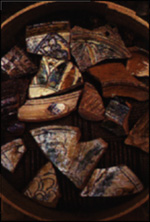
| |

 Ceramic wasters from the excavations indicate that potters were at work in the
vicinity. A faience coffee cup was signed on its base in Arabic letters (see below).
It is known that Ibn 'Iraq al-Dimashqi's son 'Ali helped popularize coffee when
he returned from Mecca in 1540, fourteen years after his father's death. Coffee
cups did turn up in the excavation. People preferred Chinese porcelain cups, but
these were rare imports. The locally made coffee cups show that the potters of
Beirut responded to the steadily increasing demand for this drink.
Ceramic wasters from the excavations indicate that potters were at work in the
vicinity. A faience coffee cup was signed on its base in Arabic letters (see below).
It is known that Ibn 'Iraq al-Dimashqi's son 'Ali helped popularize coffee when
he returned from Mecca in 1540, fourteen years after his father's death. Coffee
cups did turn up in the excavation. People preferred Chinese porcelain cups, but
these were rare imports. The locally made coffee cups show that the potters of
Beirut responded to the steadily increasing demand for this drink.
Plant samples floated at the environmental station set up at AUB, are presently being sorted. They will have to be analyzed abroad as bioarchaeologists and palaeobotanical laboratory facilities do not yet exist in Lebanon or the region. The results of these analyses will become available later, providing more detailed information about food production, processing and diet in Beirut during the periods in question.
| |
 al@mashriq 960118/960118 |
 From late Mamluk to early Ottoman times, many people lived in the quarter
around the ribat. One single deposit of broken domestic pottery behind the shrine
contained almost half a ton of sherds from this period. The vast majority consisted
of large colorful glazed bowls, plates and dishes as well as great quantities of
brown glazed cooking ware and food processing vessels. Plant food and milk
products probably dominated the diet.
From late Mamluk to early Ottoman times, many people lived in the quarter
around the ribat. One single deposit of broken domestic pottery behind the shrine
contained almost half a ton of sherds from this period. The vast majority consisted
of large colorful glazed bowls, plates and dishes as well as great quantities of
brown glazed cooking ware and food processing vessels. Plant food and milk
products probably dominated the diet.